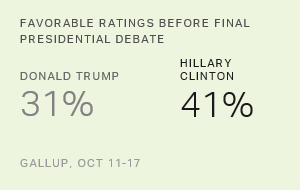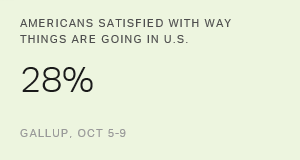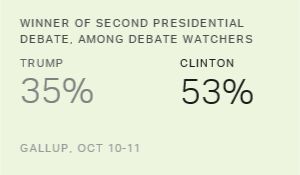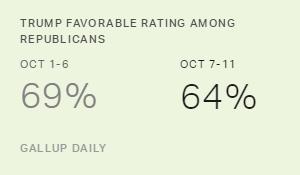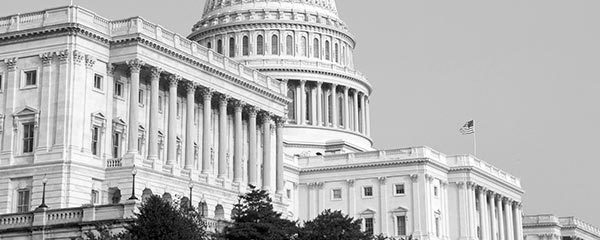Story Highlights
- Trump's image slightly less positive now than before debates
- 53% have strongly unfavorable views of Trump; 43% of Clinton
- Partisans have relatively lukewarm feelings about their candidate
PRINCETON, N.J. -- Although Americans' views of Hillary Clinton and Donald Trump fluctuated during the July political conventions and in recent weeks, the public's current views of the two candidates are about where they were before the conventions. Trump's 31% favorable rating for the period spanning Oct. 11-17 is essentially where it was in the first week of July, while Clinton's current 41% favorable rating is about the same as her 40% rating in early July.
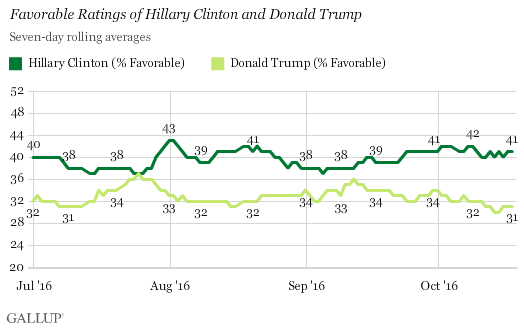
Since the conventions, the American public has witnessed two presidential debates, as well as swirling controversy over a 2005 video of Trump making lewd and controversial comments about women and more WikiLeaks releases of emails sent by Clinton and her campaign.
All of this has minimally affected the images of the two candidates. Trump's favorable score edged down a few percentage points between early September and mid-October, while Clinton's favorable rating moved up a few points. However, these changes do not represent a major shift from earlier times and underscore the stable nature of the public's views of these two high-profile candidates at this late point in the campaign.
Americans More Likely to Have Strongly Negative Than Strongly Positive Views
To the extent that Clinton and Trump evoke passion in the U.S. public, it is significantly more likely to be negative than positive. Most of those who view Clinton or Trump unfavorably say they feel strongly about those negative sentiments. In comparison, only about half of those with positive views of each candidate feel strongly favorable.
This measure is based on a follow-up question Gallup began including on Oct. 13 that asks Americans if they feel strongly or not strongly about their opinions of the candidates. Overall, 43% of Americans interviewed Oct. 13-17 say they have a strongly unfavorable opinion of Clinton, while 21% have a strongly favorable opinion. For Trump, an even higher 53% say they have strongly unfavorable views, with 16% holding a strongly favorable opinion.
| Hillary Clinton | Donald Trump | ||||||||||||||||||||||||||||||||||||||||||||||||||||||||||||||||||||||||||||||||||||||||||||||||||
|---|---|---|---|---|---|---|---|---|---|---|---|---|---|---|---|---|---|---|---|---|---|---|---|---|---|---|---|---|---|---|---|---|---|---|---|---|---|---|---|---|---|---|---|---|---|---|---|---|---|---|---|---|---|---|---|---|---|---|---|---|---|---|---|---|---|---|---|---|---|---|---|---|---|---|---|---|---|---|---|---|---|---|---|---|---|---|---|---|---|---|---|---|---|---|---|---|---|---|---|
| % | % | ||||||||||||||||||||||||||||||||||||||||||||||||||||||||||||||||||||||||||||||||||||||||||||||||||
| Strongly favorable | 21 | 16 | |||||||||||||||||||||||||||||||||||||||||||||||||||||||||||||||||||||||||||||||||||||||||||||||||
| Somewhat favorable | 23 | 15 | |||||||||||||||||||||||||||||||||||||||||||||||||||||||||||||||||||||||||||||||||||||||||||||||||
| Somewhat unfavorable | 13 | 15 | |||||||||||||||||||||||||||||||||||||||||||||||||||||||||||||||||||||||||||||||||||||||||||||||||
| Strongly unfavorable | 43 | 53 | |||||||||||||||||||||||||||||||||||||||||||||||||||||||||||||||||||||||||||||||||||||||||||||||||
| Gallup, Oct. 13-17, 2016 | |||||||||||||||||||||||||||||||||||||||||||||||||||||||||||||||||||||||||||||||||||||||||||||||||||
Republicans, Democrats Not Likely to Feel Strongly About Party Nominee
Eight in 10 Democrats and Democratic-leaning independents have favorable views of Clinton. Among this group, about half say that it is a strongly favorable view, suggesting a less-than-passionate attachment to their nominee. A similar pattern exists among those Republicans and Republican leaners who have a favorable opinion of Trump (63% overall), with a little more than half saying they strongly hold this view.
Clinton does better than Trump in terms of partisans' unfavorable views. The 36% of Republicans who have unfavorable views of Trump split evenly between those whose views are strongly unfavorable and somewhat unfavorable. Democrats with unfavorable views of Clinton (20%) are less intense, and by about a 2-to-1 margin are more likely to say they hold somewhat unfavorable rather than strongly unfavorable views.
| Clinton (among Democrats) | Trump (among Republicans) | ||||||||||||||||||||||||||||||||||||||||||||||||||||||||||||||||||||||||||||||||||||||||||||||||||
|---|---|---|---|---|---|---|---|---|---|---|---|---|---|---|---|---|---|---|---|---|---|---|---|---|---|---|---|---|---|---|---|---|---|---|---|---|---|---|---|---|---|---|---|---|---|---|---|---|---|---|---|---|---|---|---|---|---|---|---|---|---|---|---|---|---|---|---|---|---|---|---|---|---|---|---|---|---|---|---|---|---|---|---|---|---|---|---|---|---|---|---|---|---|---|---|---|---|---|---|
| % | % | ||||||||||||||||||||||||||||||||||||||||||||||||||||||||||||||||||||||||||||||||||||||||||||||||||
| Strongly favorable | 40 | 34 | |||||||||||||||||||||||||||||||||||||||||||||||||||||||||||||||||||||||||||||||||||||||||||||||||
| Somewhat favorable | 39 | 29 | |||||||||||||||||||||||||||||||||||||||||||||||||||||||||||||||||||||||||||||||||||||||||||||||||
| Somewhat unfavorable | 13 | 18 | |||||||||||||||||||||||||||||||||||||||||||||||||||||||||||||||||||||||||||||||||||||||||||||||||
| Strongly unfavorable | 7 | 18 | |||||||||||||||||||||||||||||||||||||||||||||||||||||||||||||||||||||||||||||||||||||||||||||||||
| Gallup, Oct. 13-17, 2016 | |||||||||||||||||||||||||||||||||||||||||||||||||||||||||||||||||||||||||||||||||||||||||||||||||||
The mixed feelings partisans have toward their candidate are in stark contrast to how they feel about the opposite party's candidate -- 83% of Republicans strongly dislike Clinton, and 84% of Democrats strongly dislike Trump.
Bottom Line
Americans have become slightly more positive about Clinton and slightly less positive about Trump in recent weeks, but from a long-range perspective, the two are positioned in the minds of Americans about where they were in early July. Clinton's image is currently 10 points more favorable than Trump's.
At the same time, neither Clinton nor Trump is particularly well-liked. Only about half of those who view either candidate favorably say they have strongly favorable views. By contrast, most of those who have unfavorable views of Clinton or Trump say they are strongly unfavorable. This reinforces the idea that for many voters, the 2016 election is a choice between "the lesser of two evils."
The presidential candidate with the most favorable image is almost always the one who wins the election, clearly giving Clinton the overall edge at this point. Additionally, fewer Democrats hold negative views of Clinton than Republicans hold negative views of Trump -- and among these groups, Republicans are more likely to say their negative views are strong. The impact of these attitudes on voter turnout, however, is still unclear.
Historical data are available in Gallup Analytics.
Survey Methods
Results for this Gallup poll are based on telephone interviews conducted Oct. 11-17, 2016, on the Gallup U.S. Daily survey, with a random sample of 3,582 adults, aged 18 and older, living in all 50 U.S. states and the District of Columbia. For results based on the total sample of national adults, the margin of sampling error is ±2 percentage points at the 95% confidence level. All reported margins of sampling error include computed design effects for weighting.
Each sample of national adults includes a minimum quota of 60% cellphone respondents and 40% landline respondents, with additional minimum quotas by time zone within region. Landline and cellular telephone numbers are selected using random-digit-dial methods.
Learn more about how the Gallup U.S. Daily works.
